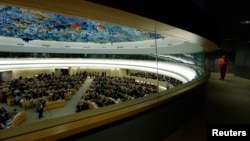Vietnam's rejection of 45 key recommendations in its U.N. human rights review has drawn criticism from activists.
Last week, Vietnam agreed to accept 182 of the 227 recommendations from its Universal Periodic Review (UPR) by the Human Rights Council. Hanoi said its decision demonstrates Vietnam's seriousness, openness and determination in promoting and protecting human rights.
But critics say the decision to reject many items is sad, if not surprising.
Trinh Huu Long, a Vietnamese human rights lawyer who attended Vietnam’s UPR adoption session on Friday, told VOA's Vietnamese service the decision shows there is no change in Hanoi’s "will, mindset and actions in human rights."
“The outcome of the UPR [Friday] completely matches the information from an official of the Vietnam Foreign Affairs Ministry two months ago saying that they would advise the administration to reject 20 percent of the recommendations related to politically sensitive issues, including the release of political prisoners, legal reform, and allow for free press," Long said.
Phil Robertson, the Asia Deputy Director for Human Right's Watch, says that while Hanoi chose to accept most of the recommendations, it rejected those that would dramatically improve human rights in the country.
"Let's talk about quality over quantity, is what I would say," he said. "Let's talk about, you know, what are the ones that Vietnam is rejecting. What are the ones that are at the core really sort of critical in terms of dealing with the people being locked away, people being in prison for peaceful exercise of their rights. You know, these provisions of the penal code that are used time and time again against various different political prisoners in Vietnam."
The U.N. Human Rights Council held Vietnam's UPR in February. Vietnam was chosen to join the U.N. rights body last year in a move that angered many activists, who said Hanoi should first improve its record.
This report was produced in collaboration with the VOA Vietnamese service.
Last week, Vietnam agreed to accept 182 of the 227 recommendations from its Universal Periodic Review (UPR) by the Human Rights Council. Hanoi said its decision demonstrates Vietnam's seriousness, openness and determination in promoting and protecting human rights.
But critics say the decision to reject many items is sad, if not surprising.
Trinh Huu Long, a Vietnamese human rights lawyer who attended Vietnam’s UPR adoption session on Friday, told VOA's Vietnamese service the decision shows there is no change in Hanoi’s "will, mindset and actions in human rights."
“The outcome of the UPR [Friday] completely matches the information from an official of the Vietnam Foreign Affairs Ministry two months ago saying that they would advise the administration to reject 20 percent of the recommendations related to politically sensitive issues, including the release of political prisoners, legal reform, and allow for free press," Long said.
Phil Robertson, the Asia Deputy Director for Human Right's Watch, says that while Hanoi chose to accept most of the recommendations, it rejected those that would dramatically improve human rights in the country.
"Let's talk about quality over quantity, is what I would say," he said. "Let's talk about, you know, what are the ones that Vietnam is rejecting. What are the ones that are at the core really sort of critical in terms of dealing with the people being locked away, people being in prison for peaceful exercise of their rights. You know, these provisions of the penal code that are used time and time again against various different political prisoners in Vietnam."
The U.N. Human Rights Council held Vietnam's UPR in February. Vietnam was chosen to join the U.N. rights body last year in a move that angered many activists, who said Hanoi should first improve its record.
This report was produced in collaboration with the VOA Vietnamese service.





